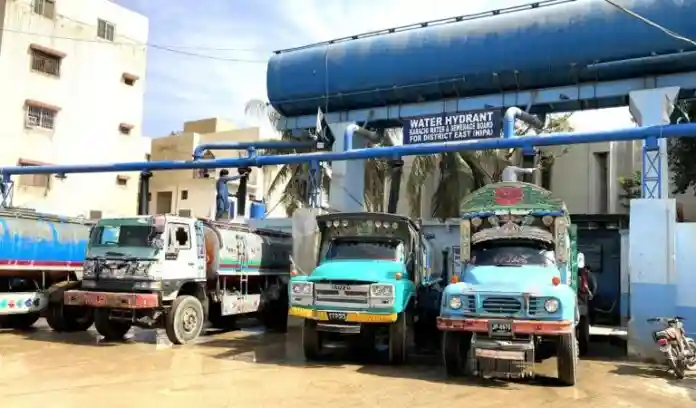- Web Desk
- Feb 19, 2026
Karachi’s water crisis deepens: Hydrant timings ‘tick’ differently
-

- Web Desk
- Aug 02, 2025

KARACHI: The Karachi Water and Sewerage Board (KW&SB) revised the closure timings of two critical water hydrants, NIPA and Safoora, to operate from 6 am to 12 pm daily, replacing previous schedule that extended into evenings and early mornings.
Officials say the new timings, implemented after a two to three-day trial, improved water distribution in Karachi’s Central District.
Read more: Senator Ali Zafar warns of looming water crisis, calls it as critical as terrorism
Pakistan’s largest metropolis boasts a population nearing 18 million and expected to exceed 20 million in the coming years. It has been grappling with worsening water shortages compounded by unchecked urban growth.
Rapid and largely unregulated urbanisation outpaced infrastructure and planning efforts, posing severe challenges for water management and flood control.
Experts at a recent seminar organised by the Pakistan Engineering Forum revealed that Karachi receives an average of 9 inches of rain annually. If properly managed through rainwater harvesting and groundwater recharge, Karachi could substantially ease the city’s water crisis.
A water expert from NED University stated that the city’s rainwater run-off from watersheds between Keenjhar Lake and the city amounts to nearly 1.83 million acre-feet annually – water currently wasted due to lack of infrastructure.
However, Karachi’s water woes are exacerbated by rampant illegal corruption by land mafias with political ties. These groups reportedly build unauthorised settlements on natural drainage basins. This blocks important waterways needed to channel monsoon rainwater.
Environmental warn that such encroachments significantly worsen urban flooding, flooding low-lying neighbourhoods and severing drainage pathways essential for the city’s storm water management.
Corruption and fragmented governance father deepen the crisis. Karachi’s water supply system suffers from massive “official theft” and inefficient distribution networks marked by leakages and illegal hydrants controlled by ‘mafias’.
As per one report, Karachi’s current water requirement is between 1,200 to 1,600 million gallons per day, but the city receives only around 500 to 550 million gallons per day.
Read more: Citizens protest over worsening water crisis in Karachi
Karachi’s urban flooding is especially troublesome during the monsoons, again due to blocked natural drainage due to illegal housing and encroachments.
With both, water scarcity and urban flooding, wreaking havoc on Karachites, coupled with increasing pressure of unchecked population growth and climate change-induced rainfall variability, authorities in Pakistan’s largest metropolis have their work cut out for them.




